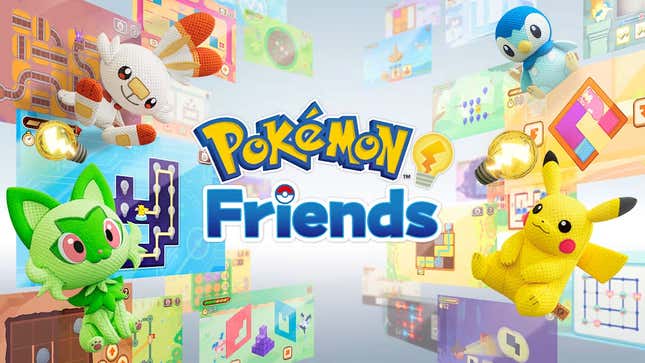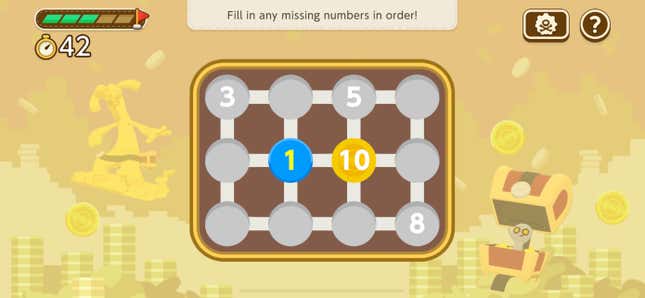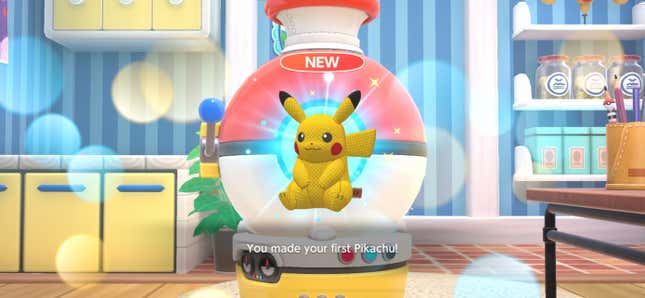
I know “free-to-play” is often a misnomer, and these games should actually be called “free-to-try,” but I haven’t played one that felt as blatant in its efforts to extract money from me as Pokémon Friends in a hot minute. The puzzle game/plush collector is cute and clearly geared toward young children, like a lot of Pokémon’s mobile apps are, but after I hit a paywall almost immediately, I was left wondering why The Pokémon Company didn’t just make it a $10 one-time purchase on every platform rather than just on Switch. Is it because mobile players are predisposed to scoff at an upfront price tag for games? Perhaps, but if the game is putting up barriers you can only bypass with cash within the first 10 minutes, why bother giving players a free taste at all? Just call it what it is: a demo.
The problem is that I can’t imagine what Pokémon Friends offers for free satisfying anyone, whether you’re the most frugal adult or the youngest iPad kid. Its collection of simple but gradually more challenging puzzles is a cute Big Brain Academy alternative, and features plenty of your favorite critters doing menial tasks, usually focusing on one of a handful of the same verbs. Pikachu connects circuits using its electricity, and you must determine the best path to follow so its thunder shock reaches every lightbulb on a grid. Drilbur is digging for underground treasure, and you must chart the best path for it to tunnel through with a limited number of moves. Some puzzles, like Piplup’s trek through an icy cave, require you to use your phone’s gyroscope to slide the little penguin to the exit. Every puzzle is intuitive and short, gradually increasing in complexity as you reach new levels in Friends’ rotating assortment of offerings. In the free version, you’ll only be able to play a couple of rounds of any of these challenges before you have to close the game out and come back later. The appeal of these forever games is that you feel like you’re chipping away at your goals gradually, but Friends’ progression systems are so slow, why not just throw a tenner into the ether to remove the leash?

Once I did that, I found Pokémon Friends a lot more tantalizing. If all I was allowed to do was spend about 10 minutes a day playing the game, I could easily see myself forgetting about it entirely. Now, I’m playing through (slightly) more challenging puzzles more frequently, and feeding into the game’s machine more readily. The puzzles themselves are still elementary, but at least I’m getting what I came for: fake Poképlush.
Pokémon Friends takes place in a new city called Think Town, which is best known as one of the major manufacturers of all the Pokémon plushies you see elsewhere in the series. The puzzles you do are time killers while you “unravel” yarn to make more stuffed toys, and every set you solve earns you enough yarn to make one randomized toy. The yarn you unravel is assigned a specific element, so if you get yellow yarn at the end of a run, you’ll be able to create a plush of Pikachu or some other electric monster. The randomness is a far more enticing draw to bring people back for repeat visits than pulling people out of the game after only a few minutes and telling them to come back later, but Friends doesn’t quite devolve into gacha mechanics to get you spending out the ass in hopes of getting your favorite critter. The only microtransactions Friends has are for unlocking more puzzles, and when you add up all those costs, it’s a steep investment for a game that has the complexity of the fake game ads you see when scrolling through your TikTok feed, but with a Pokémon coat of paint.

Maybe I’m a mark, but in spite of the whole thing being an elementary time killer that more or less twists your arm to pay its upfront cost, I like making stuffed versions of these little guys. I imagine Friends will get periodic updates to add new plushies, and so maybe down the line, I’ll have all my favorites to pose in its decorative rooms. For now, I’m booting it up when I’m bored during the day to play and taking whatever Pokémon comes out of the plush-making machine. After all this time, it turns out I’m still easily pleased by the sight of a Pocket Monster on my screen. Pokémon Friends is a mostly benign game that occasionally delights when your favorite little guy shows up. Its oddest choices are easily circumvented by a one-time $10 purchase, and it could have been more predatory, I suppose. Still, it’s a shame that free-to-play monetization has become so fraught that such faint praise feels like a glowing endorsement.